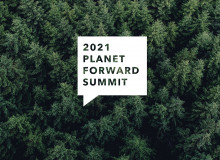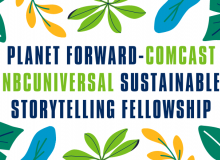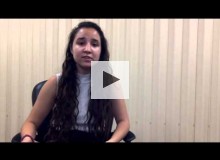Search
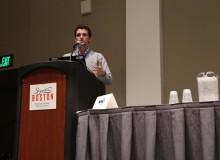
Joshua Jackson, researcher at the University of North Carolina, Chapel Hill, explained that heightened ecological threats like drought or famine could lead to more intolerant societies with stricter cultural norms. (Janice Cantieri/Medill)
Northwestern University
Thursday, February 23, 2017
Rising extremes of droughts, floods or food shortages can reduce a country’s political stability and cultural tolerance, warned scientists at the American Association for the Advancements of Science conference in Boston.
Tags: drought, climate change, AAAS, anthropology, climate adaptation, natural disasters, ecological threat, violence, politics
Founding Director, Planet Forward
Wednesday, April 21, 2021
Our 2021 Summit event hosted some of the most compelling guests — and conversations — we've ever had. Whether you want to re-watch a portion, or check out the entire event, we have all the info here.
Tags: pfsummit21, storyfest2021, storytelling, education, science communication, urgency, environmental justice, narrative, inclusion
Founding Director, Planet Forward
Friday, August 13, 2021
The three Fellows will create mini-documentaries on the frontlines of sustainability to be screened to an audience of academics, professionals, and students in the fields of science and communication at the 2022 Planet Forward Summit.
Tags: Comcast, NBCUniversal, Fellows, storytelling, sustainability, documentary
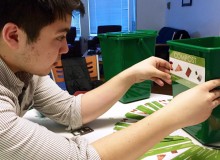
Frank Fritz assembles and labels the bins for a pilot composting program last July. (Photo courtesy The Washington ComPost at GW.)
George Washington University
Saturday, March 26, 2016
Students are leading the battle against food waste in cities. From local start-ups to wholesale retailers, young entrepreneurs seek new ways of rerouting food waste into innovative ideas.
Planet Forward, George Washington University School of Media and Public Affairs
Monday, September 29, 2014
Bill Hohenstein
Planet Forward
Tuesday, February 07, 2017
Thank you for joining us at the 2017 Planet Forward Summit!
See our full 2017 Summit report!
University of Florida
Saturday, April 02, 2016
The World Health Organization has called stress the “health epidemic of the 21st century.”
Tags: mental health, urban living, environmental stressors
Director, GW Office of Sustainability | Co-Director, SustainableGW
Monday, July 07, 2014
It's hard to get enough solar into a city using the available land - Meghan Chappel explains how working outside the city can make the difference.
Tags: capital partners solar project
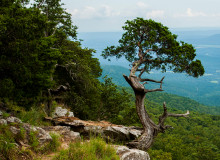
The view from a bluff in the Ponca Wilderness in Compton, Arkansas. These lands, like much of what is now the state of Arkansas, are native to Indigenous peoples including the Osage, Sioux, Quapaw, and Caddo. (Image courtesy of Thomas Shahan/Flickr https://creativecommons.org/licenses/by/2.0/).
Digital Editor, Planet Forward
Tuesday, August 10, 2021
Indigenous professor Dr. Bethany Henry Rosenbaum asked a powerful question: How do we bridge the Indigenous understanding that removal of Native people is still impactful today with the Western understanding that it’s in the past?

